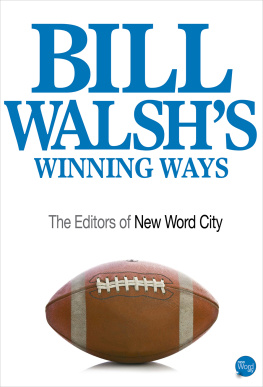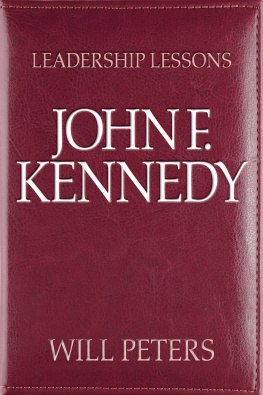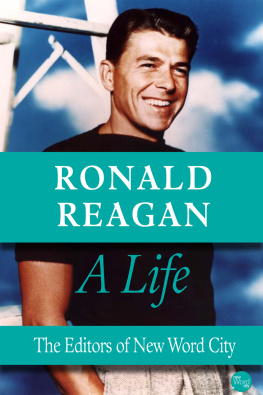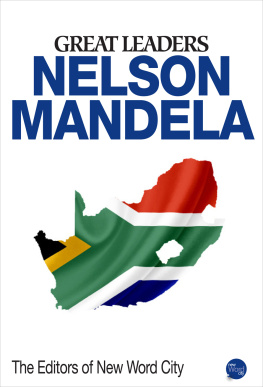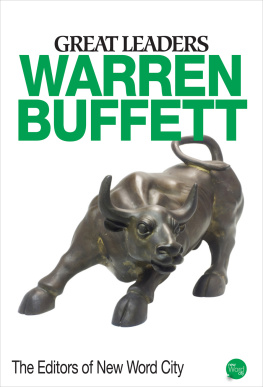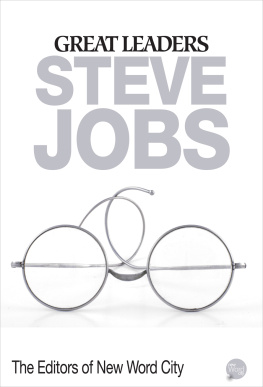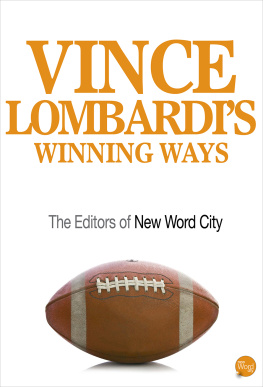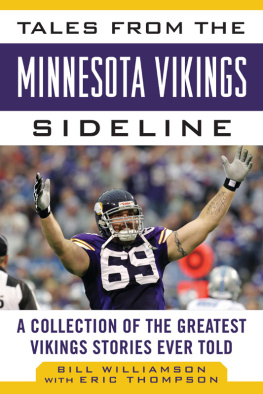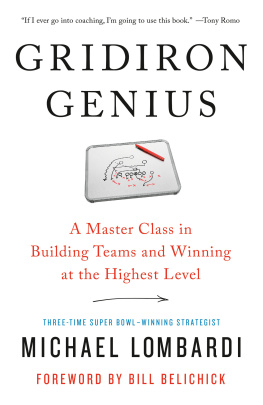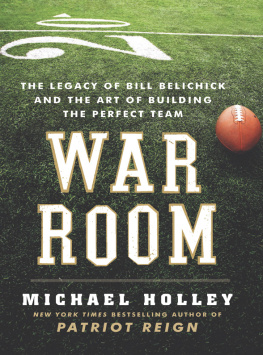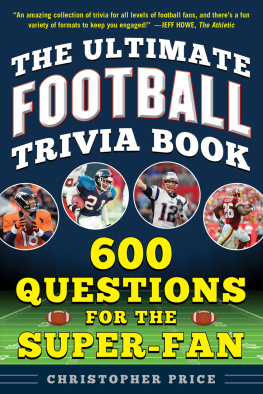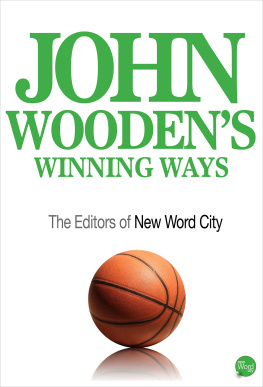The Editors of New Word City - Bill Walshs Winning Ways
Here you can read online The Editors of New Word City - Bill Walshs Winning Ways full text of the book (entire story) in english for free. Download pdf and epub, get meaning, cover and reviews about this ebook. year: 2014, publisher: New Word City, Inc., genre: Home and family. Description of the work, (preface) as well as reviews are available. Best literature library LitArk.com created for fans of good reading and offers a wide selection of genres:
Romance novel
Science fiction
Adventure
Detective
Science
History
Home and family
Prose
Art
Politics
Computer
Non-fiction
Religion
Business
Children
Humor
Choose a favorite category and find really read worthwhile books. Enjoy immersion in the world of imagination, feel the emotions of the characters or learn something new for yourself, make an fascinating discovery.
- Book:Bill Walshs Winning Ways
- Author:
- Publisher:New Word City, Inc.
- Genre:
- Year:2014
- Rating:4 / 5
- Favourites:Add to favourites
- Your mark:
- 80
- 1
- 2
- 3
- 4
- 5
Bill Walshs Winning Ways: summary, description and annotation
We offer to read an annotation, description, summary or preface (depends on what the author of the book "Bill Walshs Winning Ways" wrote himself). If you haven't found the necessary information about the book — write in the comments, we will try to find it.
Three Super Bowl rings attest to Bill Walsh as The Genius of modern professional football. But the meticulous planning and preparation that made his game, and the care he took with his people, work just as well in business, argues this brief eBook.
The Editors of New Word City: author's other books
Who wrote Bill Walshs Winning Ways? Find out the surname, the name of the author of the book and a list of all author's works by series.
Bill Walshs Winning Ways — read online for free the complete book (whole text) full work
Below is the text of the book, divided by pages. System saving the place of the last page read, allows you to conveniently read the book "Bill Walshs Winning Ways" online for free, without having to search again every time where you left off. Put a bookmark, and you can go to the page where you finished reading at any time.
Font size:
Interval:
Bookmark:
Bill Walsh was never a businessman. But business has much to learn from the brilliant head coach of the San Francisco 49ers, whose three Super Bowl championships confirm the fans savvy in nicknaming him The Genius. Time after time, Walsh used meticulous planning and training to turn ordinary teams into giant-killers, ready and able to trounce more talented opponents.
Consider that unforgettable moment in Walsh legend known simply as The Catch. With only 51 seconds left in the 1981-82 conference championship game, San Francisco trailed the Dallas Cowboys 27-21. Defeat - or victory - lay six yards ahead. Cool as ever, Quarterback Joe Montana rifled a short pass to receiver Dwight Clark , who out-jumped three defenders to snag it high in the air. Touchdown! An extra-point kick clinched the victory.
That was a practiced play, Walsh said later. He had trained Montana to pass in that specific situation, putting the ball exactly where only Clark could catch it. Walsh had drilled the team endlessly with plays for all imaginable contingencies. Each position is different, he told the Harvard Business Review, and for each you might have 15 different game situations to practice. You have to allocate time for all that, you have to practice plays, and you have to work with individuals. You need a plan for even the worst scenario. It doesnt mean that it will always work. But you will always be prepared.
Thats good advice for any leader. And thats only one of the lessons Bill Walsh can teach us.
In the tough, macho world of professional football, Bill Walsh was long considered too cerebral to be a head coach. He was certainly a late-bloomer. The son of a Los Angeles day laborer, he had only average athletic ability. He was a high school running back and junior college quarterback before becoming an injury-plagued receiver at San Jose State College. But San Jose gave him his first coaching job - and unexpected raves. His head coach, Bob Bronzan, wrote a prescient note for his files: I predict Bill Walsh will become the outstanding football coach in the United States.
In the National Football League, Walsh worked for years as an assistant coach, developing a string of top-ranked quarterbacks (including Ken Anderson for the Cincinnati Bengals and Dan Fouts for the San Diego Chargers) and inventing the rudiments of the West Coast Offense that he would later perfect with the 49ers. But his supposed mentor, Paul Brown of the Bengals, apparently perceived Walsh as a threat, fearing a rival team would hire him as head coach. Brown reportedly froze him out of top-job contention for eight years by bad-mouthing him whenever other NFL teams were looking for talent. Unaware that he was missing opportunities, Walsh stopped hoping and returned to college football as head coach at Stanford.
In short order, he turned a pathetic Stanford team into a winner of two successive bowl games. That finally won him a head-coach job offer in the NFL. The bad news was that the team was the 49ers. In 1978, the year before Walsh took charge, the 49ers had a record of 2 wins and 14 losses, the worst in the league. In his first year as head coach, the team duplicated that dismal tally.
But that was the year Walsh drafted a rookie named Joe Montana from Notre Dame. The next year, Montana was the 49ers starting quarterback, and the teams record improved to 6-10. And in 1982 the 49ers won their first Super Bowl.
The stunning leap from cellar to championship in three years dazzled the football world. More than half a million San Franciscans turned out for the parade to welcome the homecoming heroes, and Walsh became The Genius.
That moment also reflected years of thinking that eventually transformed professional football a feat comparable to transforming an industry. In retrospect, Walshs interminable wait for a team of his own was a blessing in disguise. It gave him time to analyze the game and leisure that pressured head coaches rarely enjoy. His work foreshadowed the West Coast offense, which basically reversed the traditional deep-route passing game in favor of short, precise passes, enabling a team to march neatly up the field.
In Walshs offense, the running game wasnt completely ignored, but its weaknesses could be offset by a pass called on any down. To limit the risk of sacks and turnovers, the quarterback had to throw the ball quickly and precisely to receivers fanning out on equally precise routes. Rival coaches called it a nickel-and-dime offense, but it defeated their teams. When the 49ers, also a physically underwhelming team, won their first Super Bowl in 1982, their leading rusher, Ricky Patton, finished the season with just 543 yards - half the record of the leagues best running backs.
Bill Walsh found many ways to turn adversity to advantage. To help his players withstand the rigors of playing before hostile fans on the road, he studied the morale-boosting tactics of generals in the Civil War and World War II. He talked up the team as a band of brothers in enemy country, overcoming superior forces by bonding together in epic, heroic fights. Corny or not, the idea psyched his players up, turning a negative to a positive. Similarly, he told his reserve players that, just as the best troops often fell first in the Civil War, the teams starters might be injured first - meaning the subs must never unravel if a star fell, but always stand ready to take over and achieve victory. And it worked - the 49ers often confounded opponents when an injured star was carted off the field. Instead of falling apart, the team played better.
Alleged insults to the team also proved useful. In 1982, a Monday Night Football halftime review excluded highlights of the previous days 49er victory over Dallas. Walsh himself assumed that ABC was just trying to keep viewers from skipping its Dallas coverage the following Sunday night. But he called a foul play: He told his players that ABC was not treating them respectfully - and fired up the team for its next game.
Walsh helped set a new tone for pro football - freer, more creative, more inclusive. In the old days, he said, coaches were often dictators barking orders no one challenged. Teams expected players to behave in a certain way and discarded those who broke the mold. In business as in football, the most talented people tend to be the most independent. Their offbeat abilities and insights are company assets, multipliers of growth. If a leaders pay and promotion still hinged on social pretenses and golf skills, a company would be lost in a world too smart for it to survive.
The coach is not a puppeteer, Walsh maintained, and cant worry about being seen as fallible. In a 1987 game against New Orleans, he recalled, he told the team at half-time that he would call for a certain pass play when they penetrated the Saints 30-yard line. They succeeded, but in the excitement he forgot his part. Steve Young , then Joe Montanas backup quarterback, immediately cued the coach. Walsh, who was interested only in beating the opposing team, not in appearances, appreciated his help.
In Walshs game, as in business, winning requires keeping your cool in stressful situations, the worst time for making decisions. Walsh tried to minimize the stress with scrupulous planning. He stayed awake nights imagining ways his team could be beaten and devising plays to counter them, and then spent hours drilling his team in the plays he had designed. He scripted his first 25 plays for every game days ahead of time, on the theory that he could think straighter on Thursday or Friday than in the heat of Sundays battle - and while he might depart from the script if developments on the field called for a change, he would return to it as soon as he could. His goal was always to have six practiced plays he could call in any situation, so that his players could execute them calmly, with poise and concentration, and without doubt or desperation. Around the league, the word was that Walshs 49ers were never surprised by anything.
Next pageFont size:
Interval:
Bookmark:
Similar books «Bill Walshs Winning Ways»
Look at similar books to Bill Walshs Winning Ways. We have selected literature similar in name and meaning in the hope of providing readers with more options to find new, interesting, not yet read works.
Discussion, reviews of the book Bill Walshs Winning Ways and just readers' own opinions. Leave your comments, write what you think about the work, its meaning or the main characters. Specify what exactly you liked and what you didn't like, and why you think so.

